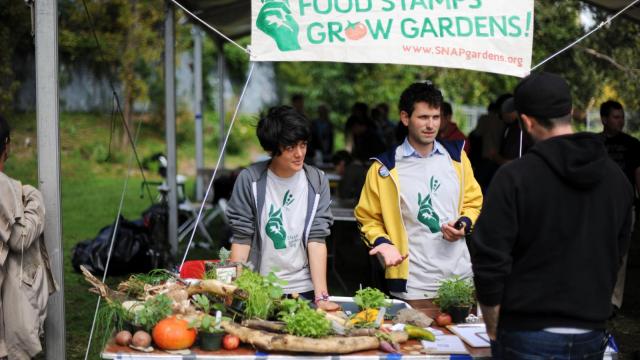
Even as the U.S. economy struggles to pick up steam and record numbers of Americans enlist the assistance of food stamps, lawmakers in Washington moved forward with a bill last week that would slash the budget for the social welfare program.
The Senate voted 66 to 27 on Monday to pass a $500 billion, five-year farm bill — a piece of legislation that addresses food prices, soil erosion, credit and unfair export prices, and national hunger. The bill also includes provisions to help farmers and ranchers and increases subsidies for major agricultural organizations such as Monsanto.
The Senate farm bill would cut the Supplemental Nutrition Assistance Program — commonly known as food stamps — by $4.1 billion throughout the next decade. This follows the House Agriculture Committee’s passing of a farm bill last month that cut the SNAP program by $20.5 billion.
The House-approved bill would also change the eligibility requirements of the SNAP program, disqualifying about 2 million Americans— including thousands of children — who are currently on food stamps.
Estimates from the U.S. Department of Agriculture suggest that there are about 50 million Americans who were “food insecure” last year, meaning their “access to adequate food is limited by a lack of money and other resources.” Of the 50 million Americans, 17 million were children.
Many Republicans and critics of social welfare programs like SNAP say the decision to cut the program and change the eligibility comes because the program’s enrollment has grown out of control in recent years.
Sen. Ted Cruz (R-Tex.), who supports the decision to make cuts to the food stamp program, said that “any meaningful support for farmers and ranchers in this trillion-dollar bill is unnecessarily held hostage to the unchecked growth of food stamp entitlements and numerous other programs unrelated to farming.”
Since about 80 percent of the farm bill is comprised of nutrition programs, Cruz added that “nearly 80 percent of [the farm bill] consists of a massive expansion in food stamps, trapping millions in long-term dependency.”
But Chad Stone, chief economist at the Center on Budget and Policy Priorities, told U.S. News and World Report that spending on food stamps will “naturally decline” as the economy recovers. For many advocates of social programs, putting more money into social programs like food stamps is essential during a period of economic uncertainty when many Americans are unemployed.
Stone says that about two-thirds of the increase in the number of Americans using food stamps is due to the weak economy. He added that 20 percent of the increased funding for the program was a temporary boost as part of the 2009 Recovery Act. Those additional funds are set to expire in November.
Since the recession, more Americans have had to rely on food stamps. For example, in 2008, 28.2 million people were enrolled in the program, compared to 47.8 million in 2012. More people in the program means that the government has to spend more money to sustain it. But since funding for the SNAP program increased from $35 billion in 2008 to $80 billion today, some politicians are concerned that the government is doing too much.
While the total amount spent on the food stamp program can be overwhelming, program participants only take home about $133 a month. Those in the SNAP program are also largely living in poverty. According to the World Socialist Web Site, the number of people receiving food stamp benefits often corresponds to the number of Americans living in poverty.
Health professionals are concerned: Since children make up a large percentage of food stamp beneficiaries, what will happen if a food-insecure child is no longer eligible?
Mariana Chilton, a public health nutritionist from the Drexel University School of Public Health in Philadelphia, told WSWS that cuts to the SNAP program will hurt millions of Americans, especially children.
“We know that SNAP cuts will be cutting into the bodies and brains of little kids,” she said, adding “we know that any kind of nutritional deprivation, even if it’s episodic, once a month during the year, affects a child’s cognitive and emotional development.”
Chilton’s comments are backed up by a study that was published in the Journal of Nutrition in 2005. The long-term study, which followed 38,000 children from across the U.S., found that food-insecure children were more likely to do poorly when it comes to academics and social progress. Food insecurity also doubles the risk of child health problems and raises the chance a child will be hospitalized by one-third.
3 WAYS TO SHOW YOUR SUPPORT
- Log in to post comments













